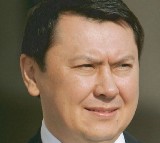 Lawyer Gabriel Lansky says that the domestic authorities have helped murderers to escape in the Rakhat Aliyev case and announced that charges were being brought in connection with the former Kazakh ambassador.
Lawyer Gabriel Lansky says that the domestic authorities have helped murderers to escape in the Rakhat Aliyev case and announced that charges were being brought in connection with the former Kazakh ambassador.
Vienna – The results of an autopsy performed by an expert at the Charité Hospital in Berlin on two bodies found in metal barrels in the Kazakh capital of Almaty and the summary of case notes from high-level official discussions in a Vienna ministry: Vienna lawyer Gabriel Lansky says both of these indicate that the Austrian authorities were negligent in the Rakhat Aliyev case. The lawyer, the legal representative of the Aliyev victims, announced that charges for abuse of office would be brought later this week.
This because the discovery that the two dead individuals were Zholdas T. and Aybar K. – bank managers for whose disappearance Aliyev, the former Kazakh ambassador in Vienna, has been sentenced in his native country to many years of imprisonment – provoked in the upper echelons of the Interior and Justice ministries only the desire to cover it up. Not a word about potential criminal consequences. Instead, Lansky said on Monday at a press conference in Vienna, [what happened was] "aiding and abetting the escape of murderers", which was the final act in a "chronology of shame".
Specifically, at the meeting on 23 May, which Lansky says was secret, high-level ministry officials first heard [testimony by] Otto Dietrich, Aliyev's lawyer.
According to the record, which Lansky was able to read through and type down, Dietrich assured [the others present] that his client, who had travelled to Malta and whom Kazakhstan had been trying for years to have extradited, did not want to return to Austria anyway.
Authorities hope for exit
Next, without Dietrich, the "course of action desired by the authorities" was agreed on. Namely, that the extradition proceedings against Aliyev would be discontinued and such proceedings against his eight associates living in Austria as asylum seekers would be refused. They would be "politically persecuted" in Kazakhstan.
Except: "Formal rejection is not even necessary if the 'accomplices had already left the country before the ruling is issued,'" according to the record. For the constitutional jurist Heinz Mayer, who was also sitting on the podium, this is unacceptable: [He argued that] if no extradition takes place, the domestic authorities are obligated to pursue criminal prosecution: "They could have ordered pre-trial detention due to the flight risk." At the Interior Ministry, Rudolf Gollia confirmed that the meeting took place. He said that it was not secret, however and was for "coordination purposes".
Aliyev's lawyer, Dietrich, views the latest developments in the case, which has gone on for years (see "Chronology"), completely differently than Lansky. "In this case, a lot of money is being used to mount a propaganda campaign against my client," he said in an interview with the Standard. [Dietrich further stated that] Aliyev, who is the ex-son-in-law of Kazakh president Nursultan Nazarbayev, had fallen into disfavour and was therefore being pursued by Nazarbayev in Austria. [Dietrich also said that] his associates would face torture and death if they were extradited.
Lansky vigorously contests this last point and cites a ruling by the European Court of Human Rights: [Which indicates that] Kazakhstan is a state governed by the rule of law. "It isn't talking about a proper state governed by the rule of law. You have to read the ruling in detail," counters Dietrich. The Green Party member Peter Pilz, who is familiar with the Aliyev case from his involvement in a parliamentary inquiry, concludes: "In this case, both sides are pursuing their own very significant interests." (Irene Brickner, DER STANDARD, Print edition, 7.6.2011)
DerStandard.com from 06.06.2011




